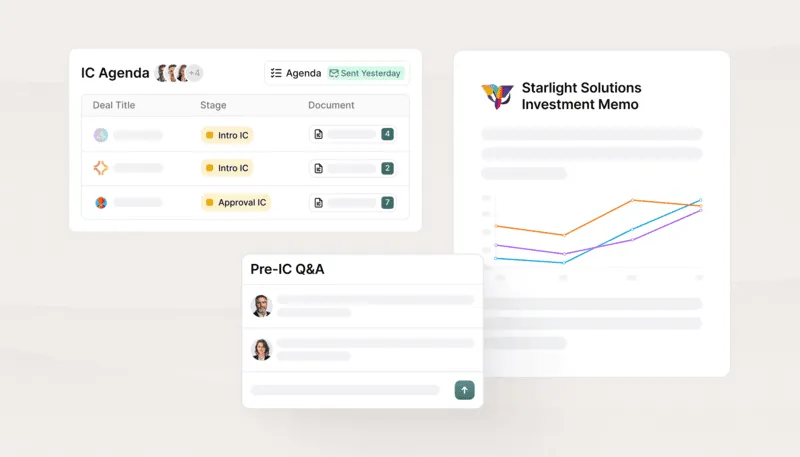Meridian raises $7M seed round led by 645 Ventures.
Read More
A definitive guide for private equity deal teams on how to optimize IC and make better investment decisions.

You’ve probably pulled an all-nighter writing an IC memo with a 60-page appendix. You’ve probably also felt the pain of a managing partner grilling you, knowing full well they never made it past the first page.
IC can be a key differentiator in your firm’s performance. Well-run IC processes mean better decision quality and improved deal speed, both of which contribute directly to your firm’s performance and returns.
At Meridian, we’ve worked closely with numerous top-tier PE firms. Through our partnership with numerous investors and our personal experiences at firms like Blackstone, Thoma Bravo, and CVC, we hear the same struggles repeatedly. We aim to help firms enhance their IC processes, making everyone’s life easier and driving better investment decisions.
This article explores why you should care so much about your IC processes, how poor IC workflows harm your firm, and expert tips for effective IC management.
IC is the single most important meeting that happens at your firm every week. It represents the culmination of all the work that deal teams are doing to source and evaluate new deals. And it’s one of the rare meetings the whole firm gets to join. For many, it’s their only exposure to senior partners.
IC cultivates your firm’s proprietary insights, from learnings and perspectives on emerging markets to insights into a deal your team found before your competitors could.
And IC memos contain a wealth of information. The Q&A and notes from IC meetings represent the collective brain and investment judgment of your firm. But once the investment committee is over, all of this work gets buried into old, forgotten folders if you run outdated, disorganized IC processes.
Associates and VPs spend hundreds of hours per year putting together slide decks and memos that contain the details of deals that could potentially bring millions in returns.
But if deal teams are sharing their IC memos 15 minutes before the meeting, do partners actually have time to dive into those insights? Or even worse, on a Sunday night before a Monday morning IC? (Easy answer: no.)
And when you share IC action items and takeaways in endless CC chains, you’re practically guaranteeing that an associate will forget to follow up with an investment banker. Finally, a lack of clear feedback from partners means deal teams feel misguided and unequipped to move deals forward.
A disorganized private equity investment process leads to:
The best firms do it differently. When you run IC like a well-oiled machine, it becomes a driver of growth and efficiency, not a burden on your whole firm.
We hear this over and over: when firms don’t enforce page limits, a page count arms race ensues. Deal teams start writing longer and longer memos, conflating page count with the quality of the deal. And senior partners stop engaging as deeply with the memos, defeating the entire purpose of writing them in the first place.
The bottom line is that absolutely no one wants to read hundred-page memos. But you’d be shocked by how many firms don’t have strict investment memo page limits. Memos should lay out the investment thesis, identify key risks, and present supporting data in the most concise way possible.
Key takeaway: Set IC memo page limits to 30 pages. This keeps them concise and packed with valuable information so partners can quickly extract the insights they need to make an informed call.
We’ve asked countless PE teams the question, “What’s one thing you’d change at your firm?” And one of the answers that comes up most frequently is IC memo submission deadlines.
Sunday or Monday IC submission deadlines are brutal on everyone, irrespective of seniority. The deal team spends the entire weekend jamming on the memo, and senior committee members have no time to engage with the materials ahead of the meeting.
After polling, consensus says that the best IC submission deadline is Thursday at 8pm for a Monday investment committee. This gives the deal team plenty of time to polish their memos while allowing senior partners to prepare and ask informed questions.
Key takeaway: For Monday meetings, set IC memo deadlines for Thursday the week prior. This ensures committee members can review and engage meaningfully ahead of time.
IC is so much more effective when partners have a platform to ask important questions ahead of the meeting. Top firms encourage IC members and other senior investors to send deal teams questions and topics for further research into company specs, market position, and potential risks before the meeting.
Not only does this give the deal team a better chance to prepare, but it also enables senior investors to pressure-test assumptions and ensure the completeness of due diligence. But right now, even the best firms manage this process by CCing the entire IC distribution email chain.
Fortunately, there’s a better way. Meridian provides a transparent platform where deal teams can upload memos ahead of time and senior investors can review and leave their questions. That way, no one’s sifting through email chains last minute to find out what a partner wanted them to gather more information on.
Key takeaway: Use a centralized platform like Meridian for proactive IC question submission. This helps deal teams prepare more effectively than messy email chains allow.
It’s incredibly discouraging for deal teams to work on a deal for months only to get shut down at IC. To prevent this, the best PE firms have a structured process for generating fast feedback on early-pipeline deals.
This forum, often referred to as the “Preliminary Investment Committee,” should require only a quick 2-page memo for deal review.
This frees up deal teams to work on more promising deals while giving IC the space to review the good deals in depth. Plus, it’s hugely motivating for deal teams to know that they have a shot at getting deals approved.
Meridian supports this vetting process by benchmarking past deals against active investment opportunities. This gives teams an idea of whether a deal is even worth bringing to IC in the first place.
Key takeaway: Run a Preliminary IC with short memos and data-driven benchmarks to filter out weak deals early. This saves time, boosts morale, and gives you more space to focus on the strongest opportunities in IC.
Investment committee is the debate venue for decision-making. It’s the training ground for investors to learn how to be better. And it’s the culmination of all the due diligence findings a deal team uncovers.
But when partners call shots behind closed doors, deal teams can feel like IC is no longer being consistent in its decision-making.
The best firms discuss the relative merits and drawbacks of deals publicly and transparently. This gives deal teams real-time feedback on the types of deals to prospect and the right areas to dig in on during diligence.
Key takeaway: Keep IC debates and decisions transparent so deal teams gain real-time feedback, learn from senior investors, and align their sourcing with what partners are looking for in an opportunity.
Nearly every discussion at IC ends with a few clear next steps and takeaways for the deal team. “Come back to IC next week with more data on renewal rates.” “Can you reduce the purchase price by 10%?”
Keeping deal teams accountable to the investment committee is crucial to actually closing deals, so whatever these next steps may be, you need to track them effectively.
But too many firms have no formal way to memorialize and track takeaways from IC meetings. That means deal teams often come back to IC two weeks later, having done a bunch of work that nobody asked for.
Top firms maintain clear records on what deal teams need to do in order to continue working on a deal and return to IC. An easy way to do this is with a platform like Meridian, which automatically generates action items after IC meetings to clarify what each member of a deal team is responsible for.
Key takeaway: Formalize and track IC action items so deal teams stay focused on agreed priorities, avoid wasted effort, and keep deals moving forward with accountability.
Meridian helps you preserve and institutionalize the intellectual capital from your weekly IC meetings. Here’s how the process works with our AI-native PE platform:
IC should be a driver of better decisions, stronger collaboration, and long-term value creation, not a bottleneck of bloated memos, siloed insight, and forgotten action items.
Meridian transforms IC into a true competitive advantage by centralizing every step of the process: from setting deadlines and streamlining memo submissions to capturing decisions and tracking next steps automatically.
With AI-powered benchmarking and summaries, your partners get the insights they need to make more informed investment decisions, while deal teams stay focused on high-value opportunities. The result is a faster, smarter, and more accountable IC process that helps your firm win more deals and maximize returns.
Meridian enables data-driven deal evaluation for smarter investment committee outcomes.

In private equity, IC stands for Investment Committee: the meeting where a firm’s senior group reviews, debates, and approves potential deals. It’s the culmination of a firm’s sourcing and diligence work, where investment theses are pressure-tested and final decisions are made. IC ensures capital is deployed into the most promising opportunities.
IC in PE refers to investment committee: the decision-making body that evaluates investment opportunities. It’s a weekly meeting where partners share judgment, test assumptions, and guide deal teams. A strong IC process helps firms move quickly without sacrificing rigour.
In venture capital, an Investment Committee serves the same primary role as in PE: deciding which opportunities get funded. At a VC fund, partners use IC to challenge assumptions, align on portfolio strategy, and decide which founders and early-stage startups to back.
Discover how Meridian can streamline deal sourcing and enhance your decision-making

Table of Contents


Discover why the most valuable private equity due diligence insights come from conversations, not spreadsheets, and how to build systematic conversation intelligence.

